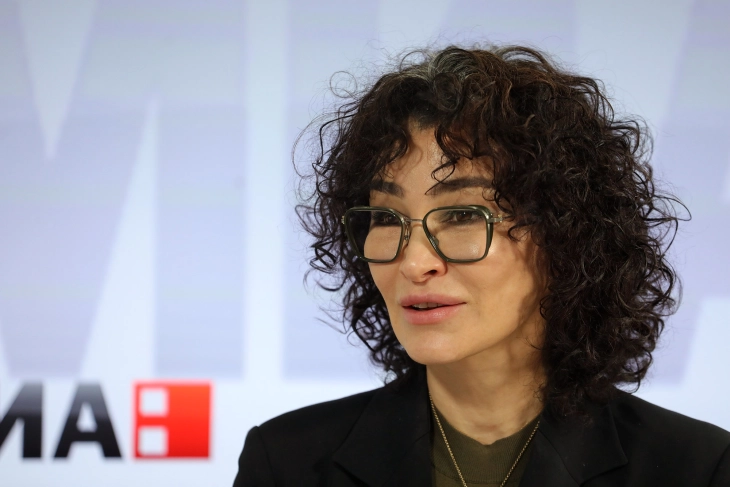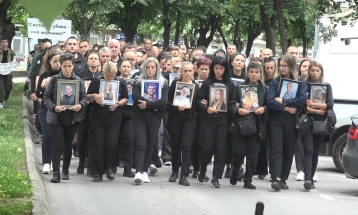Columbia for MIA: Legislative changes alone will not encourage reporting of GBV cases, necessary to address root causes of violence
- Current and future legislative changes will not be sufficient to encourage reporting of cases of gender-based violence, the issue is complex, and it is necessary to work with perpetrators as well, to understand their behaviours, to make them accountable for their actions, basically, to go to the root causes of violence, United Nations Resident Coordinator, Rita Columbia, told MIA in an interview.

Skopje, 8 December 2024 (MIA) - Current and future legislative changes will not be sufficient to encourage reporting of cases of gender-based violence, the issue is complex, and it is necessary to work with perpetrators as well, to understand their behaviours, to make them accountable for their actions, basically, to go to the root causes of violence, United Nations Resident Coordinator, Rita Columbia, told MIA in an interview.
This was Columbia’s response when asked to comment on recently proposed changes to the Law on Prevention and Protection from Violence against Women and Domestic Violence by introducing a temporary measure of perpetrators wearing an electronic bracelet that would alert victims if they are less than 100 meters away, as well as a proposal for amendments to the Criminal Code for ex officio prosecution of cases involving physical injury resulting from domestic violence, and whether they would encourage victims to report cases of violence.
“It will not be sufficient to encourage the survivors or potential victims of gender-based violence to report cases of violence or abuse. Besides, let’s talk overall, gender-based violence has different forms, it’s not only physical violence, it’s also psychological, economic, emotional, sexual – there are varieties of different abuse and violence that any member of society can experience. So, right now we see that more women and girls experience abuse and violence, less men and boys, but I mean, gender-based violence means violence against any gender. We need to work with perpetrators as well, and there are certain programs that already exist in Europe, in Western Balkan countries, including in North Macedonia, that are ran by NGOs mostly but perhaps they also need to be institutionalized by the system, the ministries, to understand the behaviours of perpetrators, to work with them, to make them accountable for their actions, to make them aware what is happening and why they behave like this. Basically, to go to the root causes of violence and try to prevent it in addition to responding. Definitely, such measures may work for certain cases but it’s not going to prevent the perpetrators from repeating the act of violence against the same person and it will not encourage the majority of women to report the cases of violence because they may not feel safe anyways,” says Columbia.

The UN Resident Coordinator, who took up her post in September, brings 20 years of experience in international development, humanitarian, and management. Prior, she served as the UN Population Fund (UNFPA) Representative in Iraq, as well as UNFPA Representative in Moldova, Country Director for Albania and as part of the UNFPA Regional Office for Eastern Europe and Central Asia’s Senior Management team.
The interview with MIA was conducted amid the ongoing "16 Days of Activism against Gender-based Violence" campaign, implemented under the auspices of the United Nations agencies, in cooperation with the European Union Delegation, the OSCE Mission to Skopje, USAID and other local and international partners. The campaign was launched with a discussion on the topic including short videos and documentaries, along with the exhibition "Scars of Resilience, Voices of Hope" by Martina Spasovska.
Columbia points out that the campaign is very important globally, as this is the time when we remind everybody, the policymakers, communities, individuals, that gender-based violence is unacceptable and all of us needs to be accountable to prevent such cases.
“This year, the campaign is targeting again all the population, specifically related to femicides, to reduce the number of women and girls who experienced gender-based violence, especially in the cases where gender-based violence resulted in murdering and killing of women and girls. And, of course, this campaign is important for North Macedonia as well. We are talking about prevention of gender-based violence and proper response to gender-based violence cases from each level including the government, including the civil society organisations, also going down to communities and at the level of families and individuals,” Columbia notes.
Asked where does she see the strengths but also the weaknesses in the country’s system in terms of countering gender-based violence, she said she was very impressed with all the legislation and policies that have already taken place in the country and the commitment of the government to this legislation.

“For example, there is a law on prevention of violence against women and domestic violence that was endorsed in 2021, also the Istanbul Convention was ratified in 2018, and the Criminal Code was changed and introduced some articles on gender-based violence, which happened in 2023. Also, the recommitted national promises for CEDAW - Convention on the Elimination of All Forms of Discrimination against Women and the Beijing Declaration and Platform for Action. So, there are so many things happening right now at the level of legislation and policies in the country, which is impressive. However, there is always plus and minus sometimes, I do not want to talk there is a minus, but definitely there is room for improvement in North Macedonia, specifically implementation of these policies, implementation of the laws that target safety and security of women and girls specifically and changing the behaviour at the level of individuals which is probably the most difficult part,” she said.
According to UN data, a femicide by a partner or a family member occurs every ten minutes. Femicide has been incorporated in our Criminal Code, with about 20 cases recorded in the country over the past 5–6 years. As regards whether legal recognition will lead to reduction, she said that in addition to legislation there should be steps taken to change the perception of gender-based violence within the communities, also to encourage and empower women themselves to report cases of gender-based violence, as it is not always happening.
“It’s not happening due to sometimes cultural norms, social pressure, sometimes personal values that exist within the family that prevent a woman or girl or anyone who has been abused or violated within the family to report this case. That’s why when we speak about statistics related to GBV, I always have a question that if all of the cases were actually reported, and based on my experience in other countries I should say that actually, no – the underreporting of GBV cases is much, much higher. And what we see in the statistics is just the tip of the iceberg that kind of exists in society. Just to add, that legislation needs to be supported by a multisectoral approach, not only one ministry or one sector is responsible for preventing gender-based violence, it goes across all the sectors within the government, but also all the sectors within the society,” she adds.
On creating equal opportunities for men and women, she points out that it is a very complex issue, but there are measures that can be taken to improve the situation, including “care economy”.
“This is a very complex issue. It goes across all the spheres of our lives, staring with economic opportunities for women. Right now, the Ministry of Economy and Labour and the Ministry of Social Policy, Demography and Youth work and they address the so-called “care economy”. The care economy means that those people who are engaged in labour, such as taking care of disabled people, taking care of babies, young children or elderly population, and in most cases it's women who are doing this job, they should be recognized and get rewarded for their work. Because in most cases, care work is done for free. As a woman you take care of your children, you take care of your elderly parents, or those people who are sick, and in addition to that you can also do other chores in the family, but this type of work is not recognised as work, and is not paid as work. One of the things the country needs to look at is this “care economy”, what measures need to be taken to first of all recognise this type of work,” she notes.

As an example of this type of economy in other countries, she mentioned France, Sweden, Canada, adding that there are countries that are benefiting from this sector of the economy.
According to her, it is also necessary to encourage family-friendly work spaces where women will not only perform motherhood goals, but also realise their potential as a person who contributes to the economic development of the country and completes career goals.
“Thus, the private and public sectors need to provide a friendly space and flexible hours for women, but also for men who take care of their children. Right now, we talk about maternity leave, but it should also be paternity leave that men as well can take a leave when they have a newborn child and take care of that child,” she says.
In the interview Columbia also discussed measures that can be undertaken to reverse the trend of low fertility rates, noting that the issue is faced by the developed countries, not by the developing countries. She says there are many approaches to increase the fertility rate, but there is always need to understand what would be the cost of it and what are the expectations.
“For example, some countries like Russia have maternal capital for many years, they have many incentives. South Korea, the same. But does it increase the fertility rate? It may increase it in a short time, to a certain level but then it’s not going to go up, because people may not see the incentives any more in financial support or, this financial support is not going to be enough for bringing up and raising children anymore. Again, because we are developing and the cost of life is also growing. That's why only with financial incentives we will never match the expectations of couples or families. As I said, it's a more complex issue when we talk about fertility rates, and a demographer would be the best person to speak about it,” she added.
Columbia notes that from the human rights approach, it’s a right of every couple, of every individual to make their own choices on how many children they want to have, and from a policy approach - family-friendly policies at work, which includes flexible hours, childcare, especially starting from a younger age; it can also include housing for young families as well.
She also commented on a recent proposal of the Fiscal Council to raise the retirement age to 67, pointing out that the retirement age issue should be comprehensibly assessed, definitely giving 60+ population opportunity to be active and to be able to work if they are healthy and if they choose so.

“This is a little bit different situation from fertility rate but, exactly, they are connected. Fertility rate in the future will increase the number of labour, the workers, because increase in population is increase in number of young people, increase in number of people who will contribute to the labour market and to the economy. Right now, North Macedonia is facing a second dividend, it’s called second demographic dividend, people live longer life and they can contribute longer to the labour market, to the economic development of the country,” said Columbia.
She adds she doesn’t know if the proposal of 67 will work well, but investing in people older than 60 years will definitely bring economic dividend.
“The most important is to make it optional. Because right now I’m not sure if even health-wise people at 67 currently today in North Macedonia will be able to continue working the same way as they did in their early age. That’s why I’m saying that this issue should be comprehensibly assessed, and definitely giving 60+ population opportunity to be active, to be healthy and to be able to work if they choose so," Columbia points out in the interview with MIA.
Below is the full video interview with the UN Resident Coordinator, Rita Columbia.
Ana Cvetkovska
Photo: Frosina Naskovikj
Video and editing: Aslan Vishko and Vladimir Rabasovikj











